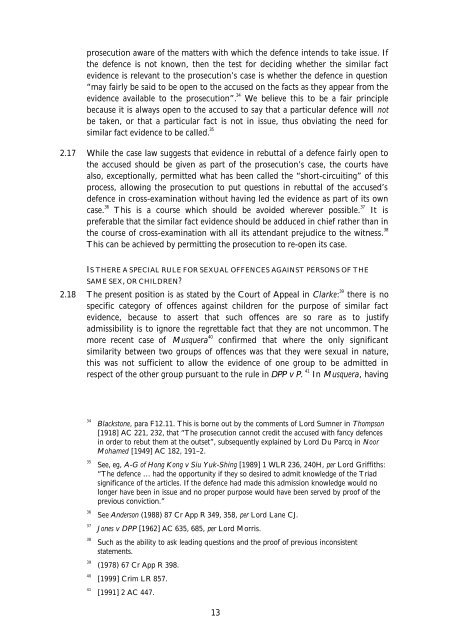Evidence of Bad Character in Criminal ... - Law Commission
Evidence of Bad Character in Criminal ... - Law Commission
Evidence of Bad Character in Criminal ... - Law Commission
You also want an ePaper? Increase the reach of your titles
YUMPU automatically turns print PDFs into web optimized ePapers that Google loves.
prosecution aware <strong>of</strong> the matters with which the defence <strong>in</strong>tends to take issue. If<br />
the defence is not known, then the test for decid<strong>in</strong>g whether the similar fact<br />
evidence is relevant to the prosecution’s case is whether the defence <strong>in</strong> question<br />
“may fairly be said to be open to the accused on the facts as they appear from the<br />
evidence available to the prosecution”. 34 We believe this to be a fair pr<strong>in</strong>ciple<br />
because it is always open to the accused to say that a particular defence will not<br />
be taken, or that a particular fact is not <strong>in</strong> issue, thus obviat<strong>in</strong>g the need for<br />
similar fact evidence to be called. 35<br />
2.17 While the case law suggests that evidence <strong>in</strong> rebuttal <strong>of</strong> a defence fairly open to<br />
the accused should be given as part <strong>of</strong> the prosecution’s case, the courts have<br />
also, exceptionally, permitted what has been called the “short-circuit<strong>in</strong>g” <strong>of</strong> this<br />
process, allow<strong>in</strong>g the prosecution to put questions <strong>in</strong> rebuttal <strong>of</strong> the accused’s<br />
defence <strong>in</strong> cross-exam<strong>in</strong>ation without hav<strong>in</strong>g led the evidence as part <strong>of</strong> its own<br />
case. 36 This is a course which should be avoided wherever possible. 37 It is<br />
preferable that the similar fact evidence should be adduced <strong>in</strong> chief rather than <strong>in</strong><br />
the course <strong>of</strong> cross-exam<strong>in</strong>ation with all its attendant prejudice to the witness. 38<br />
This can be achieved by permitt<strong>in</strong>g the prosecution to re-open its case.<br />
IS THERE A SPECIAL RULE FOR SEXUAL OFFENCES AGAINST PERSONS OF THE<br />
SAME SEX, OR CHILDREN?<br />
2.18 The present position is as stated by the Court <strong>of</strong> Appeal <strong>in</strong> Clarke: 39 there is no<br />
specific category <strong>of</strong> <strong>of</strong>fences aga<strong>in</strong>st children for the purpose <strong>of</strong> similar fact<br />
evidence, because to assert that such <strong>of</strong>fences are so rare as to justify<br />
admissibility is to ignore the regrettable fact that they are not uncommon. The<br />
more recent case <strong>of</strong> Musquera 40 confirmed that where the only significant<br />
similarity between two groups <strong>of</strong> <strong>of</strong>fences was that they were sexual <strong>in</strong> nature,<br />
this was not sufficient to allow the evidence <strong>of</strong> one group to be admitted <strong>in</strong><br />
respect <strong>of</strong> the other group pursuant to the rule <strong>in</strong> DPP v P. 41 In Musquera, hav<strong>in</strong>g<br />
34 Blackstone, para F12.11. This is borne out by the comments <strong>of</strong> Lord Sumner <strong>in</strong> Thompson<br />
[1918] AC 221, 232, that “The prosecution cannot credit the accused with fancy defences<br />
<strong>in</strong> order to rebut them at the outset”, subsequently expla<strong>in</strong>ed by Lord Du Parcq <strong>in</strong> Noor<br />
Mohamed [1949] AC 182, 191–2.<br />
35 See, eg, A-G <strong>of</strong> Hong Kong v Siu Yuk-Sh<strong>in</strong>g [1989] 1 WLR 236, 240H, per Lord Griffiths:<br />
“The defence … had the opportunity if they so desired to admit knowledge <strong>of</strong> the Triad<br />
significance <strong>of</strong> the articles. If the defence had made this admission knowledge would no<br />
longer have been <strong>in</strong> issue and no proper purpose would have been served by pro<strong>of</strong> <strong>of</strong> the<br />
previous conviction.”<br />
36 See Anderson (1988) 87 Cr App R 349, 358, per Lord Lane CJ.<br />
37 Jones v DPP [1962] AC 635, 685, per Lord Morris.<br />
38 Such as the ability to ask lead<strong>in</strong>g questions and the pro<strong>of</strong> <strong>of</strong> previous <strong>in</strong>consistent<br />
statements.<br />
39 (1978) 67 Cr App R 398.<br />
40 [1999] Crim LR 857.<br />
41 [1991] 2 AC 447.<br />
13

















